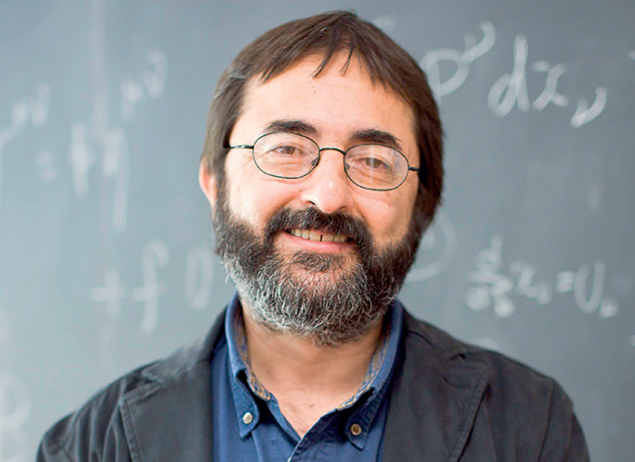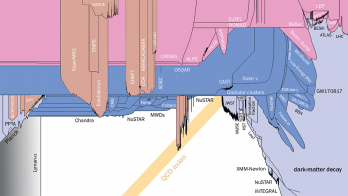As ICTP reaches its first half-century, the current director talks about the contribution that theorists make to society.

Image credit: ICTP Photo Archives.
Fernando Quevedo, director of ICTP since 2009, came to CERN in September to take part in the colloquium “From physics to daily life”, organized for the launch of two books of the same name, to which he is one of the contributors. His participation in such an initiative is not just a fortunate coincidence, but testimony of his willingness to explain the prominent role that theoretical and fundamental physics have in human development. “Theory is the driving force behind the creation of a culture of science, and this is of paramount importance to developing societies,” he explains. “Abdus Salam founded the ICTP because he believed in this strong potential, which comes at a very low cost to the countries that cannot afford expensive experimental infrastructures.”
Unfortunately, theorists are not usually credited properly for their contributions to the development of society. “The reason is that a lot of time separates the theoretical advancement from the practical application,” says Quevedo. “People and policy makers at some point stop seeing the link, and do not see the primary origin of it anymore.” However, although these links are often lost in the complicated ripples of history, it is often the case that when people are asked to recall names of famous scientists, most likely they are theorists. Examples include Albert Einstein, Richard Feynmann, James Clerk Maxwell and, of course, Stephen Hawking. More importantly, theories such as quantum mechanics or relativity have changed not just the way that scientists understand the universe but also, years later, everyday life, with applications that range from lasers and global-positioning systems to quantum computation. For Quevedo, “The example I like best is Dirac’s story. He was a purist. He wanted to see the beauty in the mathematical equations. He predicted the existence of antimatter because it came out of his equations. Today, we use positrons – the first antimatter particle predicted by Dirac – in PET scanners, but people never go back to remember his contribution.”
Theorists often have an impact that is difficult to predict, even by their fellow colleagues. “When I was a student in Texas,” recalls Quevedo, “we were studying supersymmetry and string theory for high-energy physics, and we saw that some colleagues were working on even more theoretical subjects. At that time, we thought that they were not on the right track because they were trying to develop a new interpretation of quantum mechanics. Two decades later, some of those people had become the leaders of quantum-information theory and had given birth to quantum computing. Today, this field is booming!” Perhaps surprisingly, there is also an extremely practical “application” of string theory: the arXiv project. This online repository of electronic preprints of scientific papers was invented by string theorist Paul Ginsparg. Perhaps this will be the only practical application of string theory.
While Quevedo considers it important to credit the role of the theorists in the development of society and in creating the culture of science, at the same time, he recognizes an equivalent need for the theorists to open their research horizon and accept the challenge of the present time to tackle more applied topics. “Theorists are very versatile scientists,” he says. “They are trained to be problem solvers, and their skills can be applied to a variety of fields, not just physics.” This year, ICTP is launching a new Master’s course in high-performance computing, which will use a new cluster of computers. In line with Quevedo’s thinking, during the first year, the students will be trained in general matters related to computing techniques. Then, during the second year, they will have the opportunity to specialize not only in physics but also in other subjects, including climate change, astrophysics, renewable energy and mathematical modelling.
If you are from a poor country, why should you be limited to do agriculture, health, etc?
All of these arguments should not be seen as justifications for the need to support theoretical physics. Rather, wondering about the universe and its functioning should be a recognized right for anyone. “I come from Guatemala and have the same rights as Americans and Europeans to address the big questions,” confirms Quevedo. “If you are from a poor country, why should you be limited to do agriculture, health, etc? As human beings, we have the right to dream about becoming scientists and understanding the world around us. We have the right to be curious. After all, politicians decide where to put the money, but the person who is spending his/her life on scientific projects is the scientist.”
ICTP has the specific mandate to focus on supporting scientists from developing countries. Across its long history, the institute has proudly welcomed visitors from 188 countries – that is, almost the entire planet. While CERN’s activities are concentrated mainly in developed countries, the activity map of ICTP spreads across all continents more uniformly, including Africa and the whole of Latin America. “Some countries do not have the right level of development for science to get involved in CERN yet. ICTP can play the role of being an intermediate point to attract the participation of scientists from the least developed countries to then get involved with CERN’s projects,” Quevedo comments.
Quevedo’s relationship with CERN goes beyond his role as ICTP’s director. CERN was his first employer when he was a young postdoc, coming from the University of Texas. He still comes to CERN every year, and thinks of it not only as a model but, more importantly, as a “home away from home” for any scientist. Like two friends, CERN and ICTP have a variety of projects that they are developing together. “CERN’s director-general, Rolf Heuer, and myself recently signed a new memorandum of understanding,” he explains. “ICTP scientists collaborate directly in the ATLAS computing working groups. With CERN we are also involved in the EPLANET project (CERN Courier June 2014 p58), and in the organization of the African School of Physics (CERN Courier November 2014 p37). More recently, we are developing new collaborations in teacher training and the field of medical physics.”
Does Quevedo have a dream about the future of CERN? “Yes, I would like to see more Africans, Asians and Latin Americans here,” he says. “Imagine a more coloured cafeteria, with people really coming from all corners of the planet. This could be the CERN of the future.”
ICTP’s 50th anniversary
In June 1960, the Department of Physics at the University of Trieste organized a seminar on elementary particle physics in the Castelletto in Miramare Park. The notion of creating an institute of theoretical physics open to scientists from around the world was discussed at that meeting. That proposal became a reality in Trieste in 1964. Pakistani-born physicist Abdus Salam, who spearheaded the drive for the creation of ICTP by working through the International Atomic Energy Agency, became the centre’s director, and Paolo Budinich, who worked tirelessly to bring the centre to Trieste, became ICTP’s deputy director.
From 6 to 9 October this year, ICTP celebrated its 50 years of success in international scientific co-operation, and the promotion of scientific excellence in the developing world. More than 250 distinguished scientists, ministers and others attended the anniversary celebration. In parallel, the programme included exhibitions, lectures and special initiatives for schools and the general public.
• For the whole programme of events with photos and videos, visit www.ictp.it/ictp-50th-anniversary.aspx.








